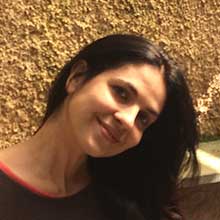What do you teach at Ca’ Foscari? What are your main research interests?
My name is Marta Strani, I am a mathematician and I arrived at the Department of Molecular Sciences and Nanosystems at Ca' Foscari University in 2018 as a fixed-term researcher. Here I teach courses in Analysis (1-2) and Linear Algebra for the programmes in Sustainable Chemistry and Technologies, Science and Technology for Cultural Heritage and Engineering Physics. My field of research is Mathematical Analysis, and my research focuses mainly on the study of partial differential equations, used to translate physical phenomena into mathematical terms: think of the wave equation, the heat equation or the Navier-Stokes equation, used in fluid dynamics. Specifically, I study the asymptotic behaviour of parabolic and hyperbolic PDEs, i.e. the behaviour of the solutions of these equations over long periods of time.
Tell us about your academic path.
I graduated in Mathematics at La Sapienza University of Rome in 2009, and I earned my PhD in Mathematics there in 2012. Since then I started moving around Italy and Europe thanks to several scholarships and research grants: I have been in Paris (first at the École Normale Supérieure and later at the Université Paris-Diderot), in Germany (University of Wurzburg) and in Milan (University of Milan Bicocca). In 2017, I started working as a fixed-term type a) Researcher at La Sapienza University, and finally in 2018 as a fixed-term type b) Researcher at Ca' Foscari University. Today I am Associate Professor in the Department of Molecular Sciences and Nanosystems at Ca' Foscari University.
Have you always known that this was going to be your path?
Yes, I have loved Maths since middle school, and in high school I started to get interested in teaching and to think that it was what I wanted to do in life. At first, I was more oriented towards teaching in high school: I liked the relationship that developed between a teacher and their students, getting to know each other, and thinking that, as a teacher, you were helping and following them as they grew through one of the most significant periods of their lives, adolescence, until they left as young adults. When I arrived at university, however, I realised that, especially in a programme such as Mathematics, where there is not (or at least there was not) an overwhelming number of students, this close relationship between professor and students was still possible. If you add the intellectual drive, which is certainly greater when you teach university-level courses, and the chance to do research, at that moment I realised that what I wanted to do in life was work in the university.
Can you offer any advice to researchers in the early stages of their career?
The research career today, especially in Italy, is not easy: you need to have passion and be motivated right from the first years of university, because there is a lot of competition. You have to be willing, if you want to have a competitive education, to travel, and to learn to call home maybe even 5 different cities in 5 years. This can be frightening at first, but in an experience of this kind you also meet a lot of young people who are following the same route, and the benefit, not only scientific, but also in terms of personal growth that you get after reaching the goals you had set yourself is enormous. And getting to know new places and people who are different from our 'comfort zone' opens your mind and creates a network of social relationships that will stay with you for the rest of your life.
The issue of gender inequality in STEM disciplines in Italy is still very topical. What would you tell girls who want to approach these disciplines?
Thankfully, during my career, I have never felt discriminated against as a woman. It is true, however, that the subject is still sadly topical, and that at times, especially in older generations, attitudes of mistrust towards women, particularly towards their scientific abilities, are 'perceived'. As a result, unfortunately, most girls who approach scientific subjects do not pursue a university career or, more generally, a research career. I would like to tell girls approaching these subjects to hold their heads high and to prove their worth by their actions, which are much more important than words. And not to be afraid, if they are passionate about it, to try to embark on a career that is still considered (unfortunately) purely male.

